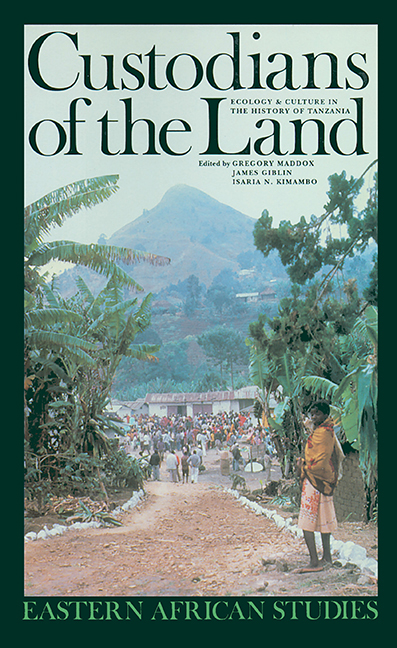Book contents
- Frontmatter
- Contents
- List of Maps, Figures & Tables
- List of Photographs
- Abbreviations
- Contributors
- Acknowledgements
- Introduction Custodians of the Land: Ecology & Culture in the History of Tanzania
- Part One Environmental & Demographic Change
- Part Two Environmental Change & Economic History: In Tanzania's Northern Highlands
- Part Three Politics & Environmental Change
- Five The Precolonial Politics of Disease Control: In the Lowlands of Northeastern Tanzania
- Six ‘We Don't Want Terraces!’: Protest & Identity under the Uluguru Land Usage Scheme
- Part Four Environment & Morality
- Conclusion
- Bibliography
- Index
Five - The Precolonial Politics of Disease Control: In the Lowlands of Northeastern Tanzania
from Part Three - Politics & Environmental Change
Published online by Cambridge University Press: 30 August 2017
- Frontmatter
- Contents
- List of Maps, Figures & Tables
- List of Photographs
- Abbreviations
- Contributors
- Acknowledgements
- Introduction Custodians of the Land: Ecology & Culture in the History of Tanzania
- Part One Environmental & Demographic Change
- Part Two Environmental Change & Economic History: In Tanzania's Northern Highlands
- Part Three Politics & Environmental Change
- Five The Precolonial Politics of Disease Control: In the Lowlands of Northeastern Tanzania
- Six ‘We Don't Want Terraces!’: Protest & Identity under the Uluguru Land Usage Scheme
- Part Four Environment & Morality
- Conclusion
- Bibliography
- Index
Summary
One day in 1983, Nyangasi Mohamedi Munga, an elderly resident of Kilwa Village in the northeastern Tanzanian district of Handeni, found himself drawn into discussion with a visiting researcher about local history and the problems of farming. A number of his neighbours gathered at his homestead to hear what he had to say, because they respected Munga for his knowledge of the past and for his diligence and expertise as a farmer. Everyone could see the results of his and his wives’ farming abilities, for their intensively cultivated plots were in full view of the homestead. The talk quickly turned, as discussions in Handeni District often seemed to do during the early 1980s, to what Munga and others regarded as the signs of increasing environmental adversity. They spoke of diminished rains, soils grown tired, widespread tsetse flies, and the bush pigs, monkeys and birds that ravaged their crops. His neighbours listened attentively as Munga explained why he thought conditions had grown worse, and why farmers had lost control over the forces of nature. He said that, in the past, farmers had cultivated contiguous plots, where they coordinated planting and harvesting to make guarding crops from birds and bush pigs easier. They did this rather than work independently, said Munga, because they were under the authority of settlement heads:
The head person could compel others to do things. Now a person was not able to go off and cultivate by himself some place. He might be killed by people from there. That's why people cultivated together. It was because of the threat of war and violence, because at that time there was no central government. The only government was of the head person who rules others. He was the ruler who protected people. That's why people cultivated together, not because they wanted to.
The last point took Munga to the heart of his argument: farmers obtained the benefits of a healthy, productive environment only when they submitted to the authority of patrons who controlled entire neighbourhoods and coordinated the labour of their dependants. Group cohesion was lost, however, in the colonial period: ‘When colonial government was introduced, people dispersed … in other words, that form of government destroyed the old forms of unity.’
- Type
- Chapter
- Information
- Custodians of the LandEcology and Culture in the History of Tanzania, pp. 127 - 151Publisher: Boydell & BrewerPrint publication year: 1996



